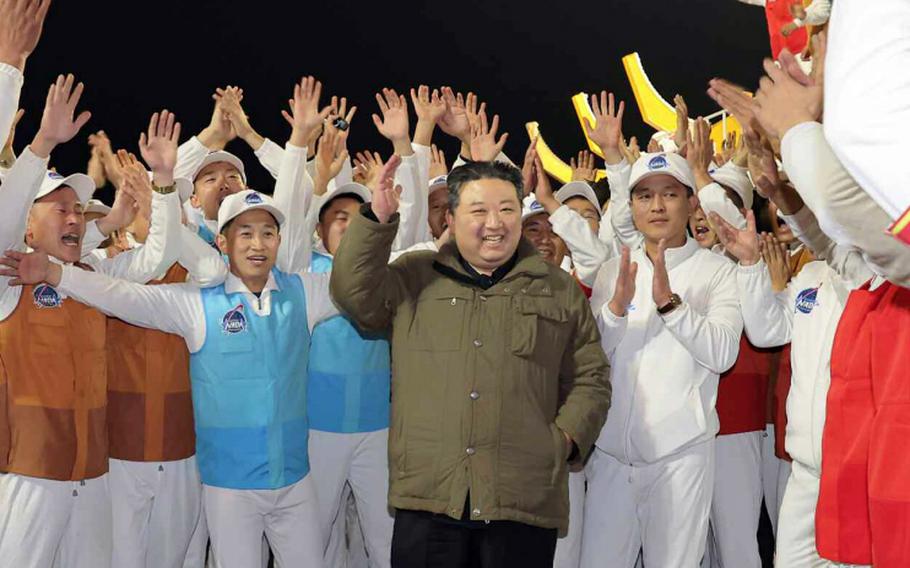
North Korean leader Kim Jong Un celebrates the country’s recent rocket launch in this image released by the state-run Korean Central News Agency on Nov. 22. (KCNA)
CAMP HUMPHREYS, South Korea — Pyongyang has scrapped a peace agreement designed to ease border tensions that was partially suspended by Seoul following a spy satellite launch late Tuesday.
“Our army will never be bound” by the Comprehensive Military Agreement, the North’s Ministry of National Defense announced in a statement published Thursday by the state-run Korean Central News Agency.
“We will withdraw the military steps, taken to prevent military tension and conflict … and deploy more powerful armed forces and new-type military hardware in the region along the Military Demarcation Line,” the ministry said.
The line, created after an armistice agreement ended fighting in the 1950-53 Korean War, is the land border separating North and South within the heavily fortified Demilitarized Zone.
The Comprehensive Military Agreement was a set of deconfliction terms signed in 2018 by North Korean leader Kim Jong Un and then-South Korean President Moon Jae-in. The accord, which established no-fly zones and prohibited armed troops at the border, was meant to be the first step toward bringing “peace, prosperity and unification” to the peninsula, according to its text.
North Korea’s statement came a day after the South partially suspended the agreement. South Korea’s military announced Wednesday it would restart reconnaissance flights at the border that were previously prohibited.
Seoul’s decision was made hours after Pyongyang launched a Chollima-1 rocket carrying a spy satellite. KCNA reported Wednesday that the satellite was successfully placed into orbit.
South Korea’s Joint Chiefs of Staff has been analyzing whether the satellite is operational.
Pyongyang “is entirely responsible” for Seoul’s decision to partially suspend the agreement, South Korean Ministry of National Defense spokesman Heo Tae-keun said at a press conference Wednesday.
“North Korea’s behavior shows again that it has no will to comply with the agreement,” he said.
South Korea will “punish” the North if it “carries out a provocation under the pretext of suspending” the agreement, Defense Minister Shin Won-sik said Thursday at a parliamentary hearing in Seoul.
Pyongyang has been banned by the U.N. Security Council from conducting ballistic missile tests since 2006. U.S. and South Korean intelligence agencies have accused the North of using their satellite launches as cover for its ballistic missile program.
The space launch vehicle used ballistic-missile technology and was “directly related to [North Korea’s] intercontinental ballistic missile program,” National Security Council spokeswoman Adrienne Watson said in a statement Wednesday.
The communist regime has fired 22 ballistic missiles in 15 days of testing so far this year.
It launched a short-range ballistic missile late Wednesday. The weapon was fired toward the East Sea, or Sea of Japan, at 11:05 p.m. from the Sunan area of Pyongyang, according to the South’s Joint Chiefs of Staff.
A text message to reporters from the Joint Chiefs said the missile had failed but did not provide additional details.